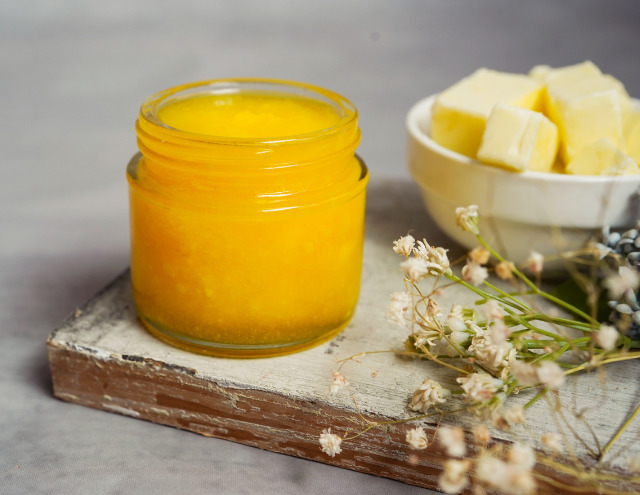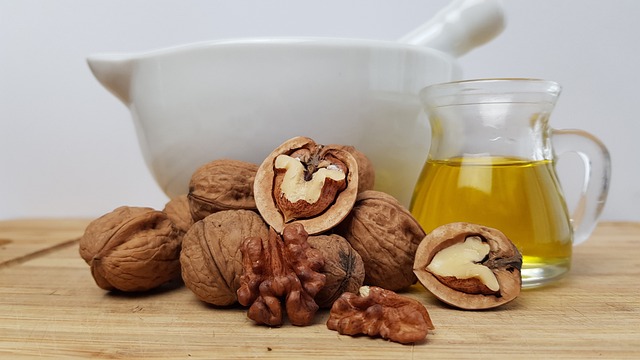Ghee, also known as clarified butter, has been cherished for centuries in traditional Indian cooking and Ayurvedic medicine. It is a versatile and flavorful ingredient that offers a range of health benefits. Let’s learn more about the world of ghee – what it is, the numerous health advantages it provides, and how to incorporate it into your diet for a nourishing and delicious culinary experience.
What is Ghee?
Ghee is a type of clarified butter that is made by simmering butter and removing the milk solids and water. What remains is a pure golden fat that is rich in flavor and aroma. Ghee has a higher smoke point compared to butter, making it suitable for various cooking methods, including sautéing, frying, and baking.
Health Benefits of Ghee
- Nutrient-Rich: Ghee is packed with essential vitamins such as vitamin A, E, and K. Vitamin A supports eye health and the immune system, while vitamin E acts as an antioxidant, protecting cells from damage. Vitamin K is vital for blood clotting and bone health.
- Lactose-Free and Suitable for Lactose Intolerant Individuals: The process of making ghee removes milk solids, including lactose and casein, making it suitable for those who are lactose intolerant or have dairy sensitivities.
- Healthy Fats: Ghee is a rich source of healthy fats, including medium-chain fatty acids (MCFAs) and conjugated linoleic acid (CLA). MCFAs are easily digested and can provide a quick source of energy. CLA has been associated with various health benefits, including reduced inflammation and improved body composition.
- Enhances Digestion: Ghee stimulates the secretion of gastric acids, aiding in better digestion and nutrient absorption. It can also help soothe and heal the digestive tract, making it beneficial for individuals with digestive issues.
- Anti-inflammatory Properties: Ghee contains butyric acid, a short-chain fatty acid known for its anti-inflammatory properties. Butyric acid has been linked to improved gut health, reduced inflammation, and enhanced immune function.
Incorporating Ghee into Your Diet
- Cooking and Sautéing: Use ghee as a substitute for cooking oils or butter when sautéing vegetables, frying eggs, or preparing stir-fries. Its high smoke point makes it suitable for high-heat cooking methods.
- Spreads and Toppings: Spread ghee on toast, muffins, or pancakes instead of traditional butter or margarine. Its rich, nutty flavor adds a delightful touch to your morning routine.
- Baking: Replace butter or oils in baking recipes with ghee for a rich and flavorful twist. It can be used in cakes, cookies, and bread recipes, providing a unique depth of taste.
- Coffee or Tea Enhancer: Add a small teaspoon of ghee to your morning coffee or tea for a creamy and satisfying beverage. This can provide sustained energy and a touch of richness.
- Ayurvedic Recipes: Explore traditional Ayurvedic recipes that utilize ghee as a central ingredient. Ghee is often used in Ayurveda for its medicinal properties and its ability to enhance the flavors and benefits of various herbs and spices.
Ghee is a versatile and nutritious ingredient that offers a wide array of health benefits. With its rich flavor, high smoke point, and potential therapeutic properties, ghee is a valuable addition to any culinary repertoire. Whether used for cooking, baking, or as a spread, ghee can elevate the taste of your dishes while providing essential nutrients. Add it to your diet today!
Image from Canva
Oils
-

Grapeseed Oil: A Versatile and Nutritious Cooking and Skincare Oil
Grapeseed oil is a popular cooking oil and skincare ingredient derived from the seeds of grapes. It is widely recognized for its light flavor, high smoke point, and numerous health and beauty benefits. With its unique nutritional profile and versatile applications, grapeseed oil has become a staple in kitchens and beauty routines worldwide. In this…
-

Wheat Germ Oil: A Nutritional Powerhouse for Health and Beauty
-

The Surprising Link Between Coconut Oil and Weight Loss
-

Some Uncommon Oils to Dress Salads That You Must Try Today
-

Why You Need Ghee – Definition, Health Benefits, and Culinary Uses
-

Sunflower Oil: Exploring Pros and Cons of its Usage
-

The Hidden Truth: Why Canola Oil May Not Be the Best Choice for Your Health








Leave a Reply